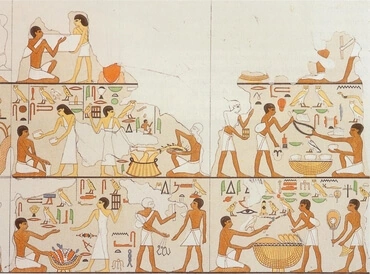Three Feasts
By New Christian Bible Study Staff

The Children of Israel were told to keep three feasts each year - the feast of unleavened bread, the feast of first fruits, and the feast of ingathering. Should we still do that?
In Exodus 23:14-16, Moses receives the instructions about these feasts. Those three verses in Exodus comprise our brief story. Their inner meaning is explained in Arcana Coelestia 9286-9296.
There are three feasts. In the Word, the number three represents a completeness, a sense of things being covered from beginning to end. Our thankfulness to the Lord is supposed to keep going - to endure.
The first feast, of unleavened bread, stands for worship, for our thankfulness for the Lord's action in our minds to get rid of false ideas. That enables us to start to receive good loves.
The second feast, of first fruits, relates to the planting of true ideas in that "soil" of initial loves for doing good.
The third feast, of harvest, or ingathering, stands for the time when, by applying our true ideas, we receive real good - loves of the neighbor and of the Lord - that become the middle of our lives. This is the state of rebirth, where we have - by working through the year (our lives), and enduring in thankfulness, allowed the Lord to get rid of our false ideas, and push our evil loves to the periphery, so that good can work, and be fruitful.
These feasts, then, represent the progress of our spiritual lives. In some manner, we need to keep them.
Egypt

In the Bible, Egypt represents knowledge and the love of knowledge. In a good sense that means knowledge of truth from the Lord through the Bible, but in a natural sense it simply means earthly knowledge to be stored up and possessed. And even knowledge from the Bible is not always good: If we learn them with the goal of making them useful, then they are filled with angelic ideas. But they lack purpose when they are learned only for the sake of knowing things or for the reputation of being learned. So Egypt is a place you go to learn things, but to become heavenly you have to escape the sterile "knowing" and journey to the land of Canaan, where the knowledge is filled with the internal desire for good. It's interesting that when Egypt was ruled by Joseph, it was a haven for his father and brothers. This shows that when a person's internal mind rules in the land of learning, they can learn much that is useful. But eventually a pharaoh arose that didn't know Joseph, and the Children of Israel were enslaved. The pharaoh represents the external mind; when it is in charge the excitement and self-congratulation of knowing can reduce the internal mind to a type of slavery. The mind - like the Children of Israel - ends up making bricks, or man-made falsities from external appearances.






